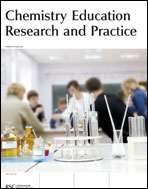Developing practical chemistry skills by means of student-driven problem based learning mini-projects
Abstract
Problem-based learning mini-projects (‘PBL mini-projects’) are used as an alternative to the traditional ‘recipe-style’ laboratory teaching method with the aim of enhancing students’ experience of chemistry laboratory practicals. Small groups of students (3–4) in the second year of their degree are assigned a project title and they must devise the experimental protocol to carry it out. This teaching method better reflects real-life problem solving situations. The students responded favourably in their feedback on these laboratory classes. Class attendance and general class morale were found to be noticeably higher than in previous years. This paper describes the implementation of the PBL mini-projects in our teaching laboratories and examines some feedback obtained from the students (42 in total) and teaching staff involved over a two year period (2004/5 and 2005/6). [Chem. Educ. Res. Pract., 2007, 8 (2), 130-139]
- This article is part of the themed collection: The Laboratory in Science Education: The State of the Art

 Please wait while we load your content...
Please wait while we load your content...